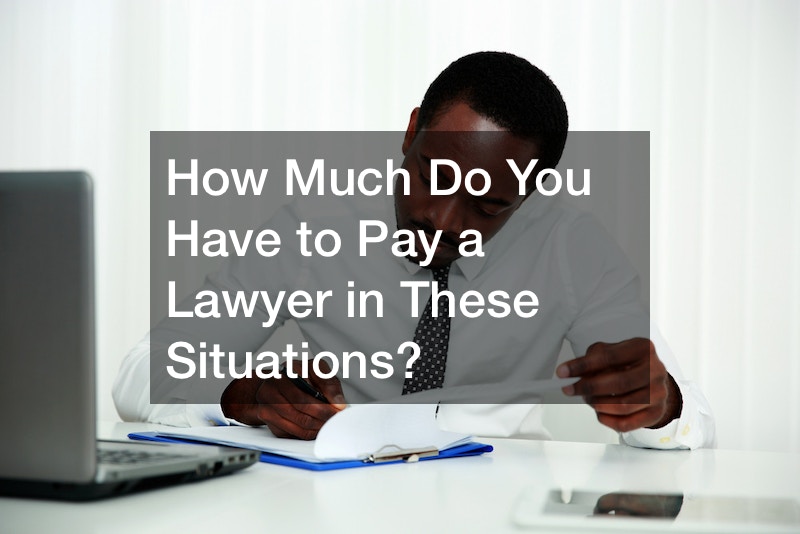
Love them or hate them, lawyers are like oxygen, you can’t live without them. Well, maybe that’s stretching an analogy too far, but suffice it to say that almost every adult has at one time or another sought the services of a lawyer. Many situations call for the intervention of a lawyer, and each of these situations demands that you pay a certain legal or representation fee. Failure to do so could easily land you in trouble, and jeopardize your chances of winning a case, which could be serious, especially if you’re seeking compensation for damages or personal injuries.
So, how much do you have to pay a lawyer, you ask? Well, it depends on the situation you’re in. Below are several situations and how much you’re likely to pay for each:
You’ve Been Accused of a Crime

One of the most common situations that demand procuring the services of a lawyer is if you’ve been accused of committing a criminal offense. In such a case, you’ll need a criminal defense lawyer who understands what it takes to represent a criminal. Of course, being accused of a crime doesn’t mean you’re a criminal, it just means you need a law firm with experience in litigating criminal cases to get you out of the jam you’re in.
For argument’s sake, let’s assume you’ve been falsely accused of committing a crime. Before we even get into issues such as “how much do you have to pay a lawyer”, here are several things that could make your case worse, and so you’re well advised to avoid them:
- Destroying evidence that you think could work against you. This could land you in deep trouble, more trouble than you’re currently in
- Trying to contact a witness or victim. Again, should such untoward behavior come before a jury, you’re in funk
- Not having your lawyer present when talking to the criminal investigator, the prosecutor, or the police. Chances of incriminating yourself or saying things you shouldn’t are very high in such situations
- Agreeing to a test, such as a DNA, in the absence of your criminal defense lawyer
In the U.S., expect to pay an hourly fee of between $100 and $400 for a criminal defense lawyer. While you have the right to represent yourself, you could be in a serious financial mix should you decide to avoid procuring the services of an attorney. The legal fee you pay now could be what you need to avoid punitive penalties later on.
You’ve Been in a Car Accident

Picture this! You’ve had one too many and, against your better judgment and protestations from your buddies, you fumble for your car keys, get into your vehicle, and drive off. Minutes later as you speed down the expressway, you lose focus and hit a street light, or worse, an oncoming vehicle. Luckily, you survive to tell your side of the story before a judge. Okay, let’s assume this is not you but one of your friends. The first thing they will need is to get in touch with one of the best accident attorneys around. This is critical since drunk driving requires a DUI attorney with experience representing clients just like you.
In answering the question, how much do you have to pay a lawyer, first consider yourself lucky to have survived a car accident. Many people don’t live to tell their side of the story. With about 32 people dying every day in the United States from accidents caused by drunk driving, you can safely conclude that a person dies in the U.S. every 45 minutes. Take for instance 2020 when everyone was supposed to be hunkering down due to the COVID-19 pandemic. Road traffic deaths resulting from alcohol-compromised driving were responsible for 11,654 deaths. This was a 14% bump from the 2019 statistics, and it’s safe to say that all these deaths could have been avoided, especially when no one was expected to dine or work out.
So, how much do you have to pay a lawyer, a DUI attorney? If you find yourself in need of a DUI lawyer, expect to pay between $1,000 and $5,000 if the case doesn’t proceed to trial or $100 to $500 per hour. If the case proceeds to trial, you will need between $5,000 and $10,000, and this doesn’t include expert witness fees.
You’re Planning Your Will
Most people consider the subject of death too morbid to contemplate. However, death is one of those facts of life that everyone will come face to face with one day, no matter their position or disposition in society. Drawn-out succession battles among family members are usually a result of a loved one dying without leaving a will to explain exactly how they want their estate shared out. In such instances, estate attorneys find themselves forced to intervene to help sort out the mess, hopefully without having to go to court, although in some cases this is an inevitable outcome.
To make sure such a situation doesn’t affect you, it’s prudent to plan your will now while you’re still alive. Once the grim reaper strikes, the opportunity to have a living will lawyer draft a will for you is lost. But why does one need a will in the first place? Here are a couple of compelling reasons:
- You save your loved ones stress, money, and time. They don’t have to waste time going to a probate court and going through the legal process of assets distribution
- To appoint a manager of your estate. It’s your right, after writing a will, to appoint an executor. This is the person who will execute the will you wrote
- To decide who gets what, and who doesn’t. A will lists the beneficiaries of an estate, including those that aren’t on the will
- A will may nominate a guardian for minor children left behind. In most cases, it’s the surviving parent or guardian who takes legal custody of minors when their partner dies
- You can nominate a favorite charity or cause as a beneficiary in a will. If you’re keen on leaving a legacy, something that outlives you, consider leaving part of your estate to a charity or your favorite caus
So, how much do you have to pay a lawyer when planning your will? On average, you can expect to pay anywhere from $300 to $700. The variance is explained by the fact that estate attorneys in large firms tend to charge more than their counterparts in smaller firms.
You’re Getting a Divorce

The aftermath of a divorce can be brutal. While in some cases, a partner can see a divorce coming from a mile away, in other cases it comes unannounced. There have been cases of couples parting ways after years of living together on grounds such as irreconcilable differences, or just because they grew apart and were no longer compatible. Whatever the reason for a divorce, there’s one person you’ll need on your side, a divorce attorney.
How much do you have to pay a lawyer, specifically a divorce attorney? This depends on your state, your budget, and the profile of the legal firm you’ve settled on. No two divorce cases are indeed similar. Each is different, which means the fee varies from one situation to another, and from one law firm to the next. On average, however, a divorce lawyer will charge a fee of $3k to $5k to start your case. Beyond this figure, expect to pay between $300 and $500 for every additional hour they’re on your case, and you’ve not even paid for court fees and other divorce-associated costs. Among the costs you may be called upon to settle include child custody evaluation, mediation, and filing fees. Depending on your state, you can expect to pay between $70 and $350 to file a divorce case, and these rates could climb even higher should the judge order a child custody evaluation. If the parties resort to mediation, there are costs associated with this approach as well.
You’re Declaring Bankruptcy
Debt can be debilitating. It’s like a disease that weighs one down, threatening to crash them at every turn. When in debt, it almost feels like there’s no way out; but this isn’t the case. There’s a facility called “declaring bankruptcy”, and while no one wants to be in this position, it offers a way out of debt, or at least a reprieve for one to pay the debt in easy installments. Bankruptcy lawyers exist to help you navigate the murky waters of declaring bankruptcy and get you on a path to financial recovery.
There are many reasons one would be advised to declare bankruptcy. One of these is when your house is at risk of foreclosure due to failure to pay mortgage installments. You may also decide to apply for bankruptcy if you’re under constant harassment from debt collectors. In such and many other dire instances, declaring bankruptcy may be the most viable option, or not.
There are instances when filing for bankruptcy can reduce or get rid of your debt. It could also keep debt collectors at bay, or even keep your house from being foreclosed. Nonetheless, there’s a high likelihood that your credit score could suffer irreparable damage, making it difficult for you to get loans in the future. With a compromised credit score, you become a high-risk customer to lenders and insurance companies, which means insurance and lending rates are pushed upwards for you, sinking you further into debt. In some cases, a bad credit score could jeopardize your chances of securing a job.
When applying for bankruptcy, you can’t afford to do it without a bankruptcy lawyer, and they come at a cost, which varies depending on the type of bankruptcy. For instance, to file a Chapter 7 bankruptcy case, you’ll be required to pay $335, and $310 for a Chapter 13 bankruptcy case. Additionally, you’re likely to be charged between $15 and $20 by a bankruptcy trustee upon filing.
If you don’t qualify to file for bankruptcy under Chapter 7, you can file under Chapter 13, which doesn’t attract an extra fee. Nevertheless, should you change your mind mid-stream after filing under Chapter 13, and after defaulting on plan payments, you’ll be charged a $25 conversion fee.
You Got Injured at Work

Workplace injuries are common in most companies. Most are minor and rarely require the intervention of personal injury attorneys. However, some are serious enough to result in disabilities that compromise one’s ability to work. In such cases, disability attorneys are critical to ensuring one receives the compensation they deserve.
The main causes of workplace injuries are accidents at work. Since an employer is charged with a duty of care to ensure all workers are safe at the workplace, when injury-causing accidents happen, it’s critical to seek the services of a personal injury attorney. The goal is to claim compensation for your injuries, and if the injuries lead to a disability, you need a good disability lawyer to get you the compensation that takes into account your inability to work and function as you used to.
How much do you have to pay a lawyer if you get injured at work? In most cases, the practice is to calculate the fees at 25 percent of a client’s backpay (past due benefits). Ideally, the fees shouldn’t be more than $6,000 per client. For instance, should a client’s past due benefits be $10,000, the attorney fee calculated at 25% is $2,500.
The question “How much do you have to pay a lawyer?” has many different answers. This is because it largely depends on the situation one is seeking legal representation for. Another consideration is the size of the law firm from which one seeks legal assistance. Nonetheless, really, how much do you have to pay a lawyer? Hopefully, you won’t find yourself in a situation where you need legal services, but if (or more likely, when) you do, finding out exactly how much you have to pay a lawyer may be the least of your worries.


